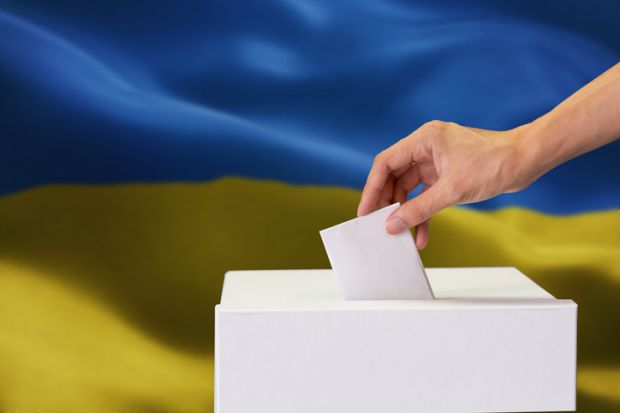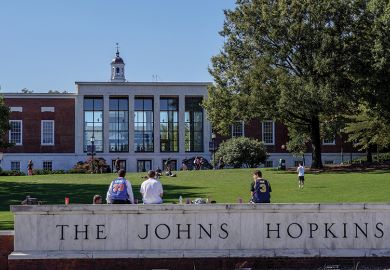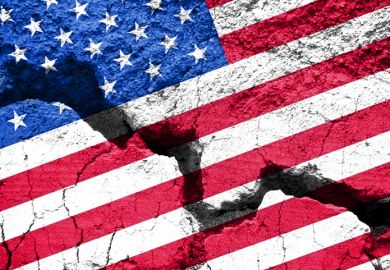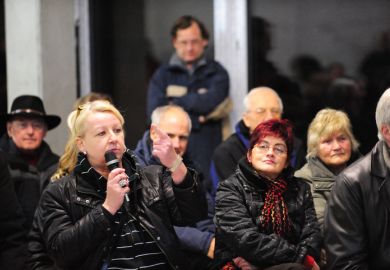In poignant and herculean ways, Ukrainians are teaching a masterclass in the defence of democracy. Will American colleges and universities, ostensibly entrusted to educate the masses and further democracy, study this lesson from abroad – or continue to sleep through class?
Our US systems of higher education and democracy have been inextricably linked since the nation’s founding. Thomas Jefferson, the third president and founder of the University of Virginia, once proclaimed: “Educate and inform the whole mass of the people. Enable them to see that it is their interest to preserve peace and order, and they will preserve them.”
Yet both American higher education and democracy have been battered in recent years. We know Ukraine’s existential threat is from without: the hateful and violent expression of democracy’s adversary. In the US, our existential threat is from within: the monotonous expression of our obdurate selves.
THE Campus resource: A higher education playbook for strengthening democracy
It’s a pivotal moment for those who seek to strengthen democracy or who, like me, are tasked with preparing young adults for active citizenship. We need to reassess who we are as a nation and ask why we’re tolerating such extreme division and deception. For too many, democracy has become a commodity – something to be bargained with in a quest for power. Do we no longer value what has been handed down to us on the back of great stress and struggle? Do we no longer feel obligated to contribute to democracy’s preservation?
The same cynicism is infecting higher education. Data show that a college degree remains the surest way to remove an individual from poverty, yet we continue to quibble about whether a college degree is worth it, whether higher education needs to change (it does), and what kind of education – from trade schools and community colleges to small private and large public universities – matters (all of it).
The Ukrainian crisis is reminding Americans that democracy and human progress go hand-in-hand. But in a robust democracy, or a just society, none of us are free, safe and valued unless all of us are free, safe and valued. This is where we are going wrong.
At Jesuit institutions such as the one where I serve as president, we teach our students to value the dignity and worth of each person, and understand that our formation as citizens can only progress in the context of community. When we think about our freedom to speak and act, practise religion, own property and elect our leaders through majority rule, we know that our responsibilities to our fellow citizens must strike an equal balance.
This thinking reflects a radical departure from the individualistic behaviours that have eroded our American systems. So what must change? Within higher education, we must champion more perspectives and viewpoints, and in the context of a community that honours and respects the heterogeneity of its members, rejects censorship and encourages fervent and respectful debate.
We should candidly reassess the efficacy of programmes that were created to support democracy, such as our general education courses and service-learning programmes, through the lens of 21st-century expectations. Should we mandate lessons in civics, politics or ethics, for instance?
Another fundamental truth about America’s democracy is the diversity of its people. The US cannot cohere based on an ethno-nationalist identity. Many of us have failed in our efforts to enrol more students from diverse backgrounds as national demographics have changed. We must amplify our efforts to attract the diverse cultural mosaic of the American people, including Pell-eligible, under-represented and undocumented students, knowing that we cannot be true to the American experiment in democracy by living and learning entirely with people who act, speak and look the same.
The Ukrainian conflict also reminds us that freedom and equality are entirely compatible with a sense of the common good. Indeed, if we want to live together in a thriving democracy, we need to define what matters most and rekindle a collective ethos. And higher education institutions clearly have a big role to play in that conversation.
Let’s unite behind a shared platform – focused on necessities such as healthcare, quality education and a living wage – and equip our students to advance this agenda. Let’s make it easier for them to vote, volunteer or intern for elected officials. Let’s help them run for political office themselves. Let’s help them become the conciliatory leaders our nation needs.
Americans have been bickering for so long, do we even remember who or what we’re fighting for? The citizens of Ukraine do. They’re willing to die to preserve the democratic ideals we so readily take for granted.
Ours is a far easier task: to distribute truth and knowledge, support an informed and educated citizenry, value the dignity and worth of each individual, and pursue the common good. There is a major crisis in America, but we have rarely faced a less formidable foe.
Vincent Rougeau is president of the College of the Holy Cross, Massachusetts.
Register to continue
Why register?
- Registration is free and only takes a moment
- Once registered, you can read 3 articles a month
- Sign up for our newsletter
Subscribe
Or subscribe for unlimited access to:
- Unlimited access to news, views, insights & reviews
- Digital editions
- Digital access to THE’s university and college rankings analysis
Already registered or a current subscriber?








